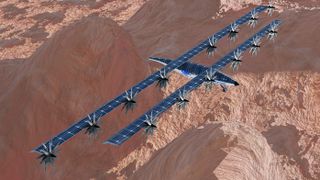Wild Mars plane concept could seek water from high in the Red Planet's atmosphere
It would be the first fixed-wing aircraft to fly on Mars.

The search for water on Mars could include a hunt from Red Planet skies.
An early-stage vehicle, affectionately called MAGGIE, would search for water on Mars from high in the planet's atmosphere. In fact, MAGGIE just received its first tranche of funding from NASA on the long road to getting ready for flight.
While there's no timeline yet for the craft's first flight, another flying vehicle on Mars continues to exceed and excel. The Ingenuity helicopter on the Red Planet, originally built for a mere five flights, is well past 70 liftoffs and is still going strong. It's currently helping its rover partner, Perseverance, search for ancient water and life on the arid world.
Ingenuity is an incredible nod, agency officials stated earlier this month, to the power of the NASA Innovative Advanced Concepts (NIAC) program as it represents the heritage of this helicopter's technology. So, looking to the success of Ingenuity, there's hope that MAGGIE may one day follow in its flight-steps and further explore Mars from the air.
Related: NASA funds Venus sample-return, interstellar probes and other far-out space tech
MAGGIE, the Mars Aerial and Ground Intelligent Explorer, is a solar-powered aircraft designed to take off and land vertically. Its technical brief states it can fly as far as 111 miles (179 km) on a single charge and is rated to cruise for nearly 10,000 miles (16,048 km) during a single Mars year, which is equal to roughly 24 months on Earth.
Flying 3,300 feet (1,000 meters) above the Red Planet, MAGGIE would focus on three science investigations: the hunt for water, a better understanding of the source of the weak Mars magnetic field, and the search for signals of elusive methane (which may or may not be a signal of life, depending on the source.)
Get the Space.com Newsletter
Breaking space news, the latest updates on rocket launches, skywatching events and more!
The caveat with MAGGIE is how early-stage the technology is, principal investigator Ge-Cheng Zha of Coflow Jet, LLC wrote in the mission's technical notes. While the concept "appears to be feasible," Zha urges further study "under Martian atmospheric conditions," which would be less than 1% that of Earth's at sea level.
Providing the Phase 1 funding from NIAC allows the concept to continue, Zha said, also explaining that the plane would be useful for large-scale surveys one day.
MAGGIE, Zha stated, "would revolutionize our capability of exploring almost the entirety of the Martian surface" and would get a lot of public engagement due to its "audacity, and in the variety of environments it could explore, study and image."
MAGGIE's funding under NIAC does not necessarily guarantee a future flight date, but there are other Mars flyers that may be on the way shortly — pending ongoing troubles with funding, that is. The Mars sample return mission, which may bring back caches from Perseverance in the 2030s, could include two helicopter fetchers if the rover is unable to get the caches to the return vehicle itself.
Join our Space Forums to keep talking space on the latest missions, night sky and more! And if you have a news tip, correction or comment, let us know at: community@space.com.

Elizabeth Howell (she/her), Ph.D., is a staff writer in the spaceflight channel since 2022 covering diversity, education and gaming as well. She was contributing writer for Space.com for 10 years before joining full-time. Elizabeth's reporting includes multiple exclusives with the White House and Office of the Vice-President of the United States, an exclusive conversation with aspiring space tourist (and NSYNC bassist) Lance Bass, speaking several times with the International Space Station, witnessing five human spaceflight launches on two continents, flying parabolic, working inside a spacesuit, and participating in a simulated Mars mission. Her latest book, "Why Am I Taller?", is co-written with astronaut Dave Williams. Elizabeth holds a Ph.D. and M.Sc. in Space Studies from the University of North Dakota, a Bachelor of Journalism from Canada's Carleton University and a Bachelor of History from Canada's Athabasca University. Elizabeth is also a post-secondary instructor in communications and science at several institutions since 2015; her experience includes developing and teaching an astronomy course at Canada's Algonquin College (with Indigenous content as well) to more than 1,000 students since 2020. Elizabeth first got interested in space after watching the movie Apollo 13 in 1996, and still wants to be an astronaut someday. Mastodon: https://qoto.org/@howellspace
